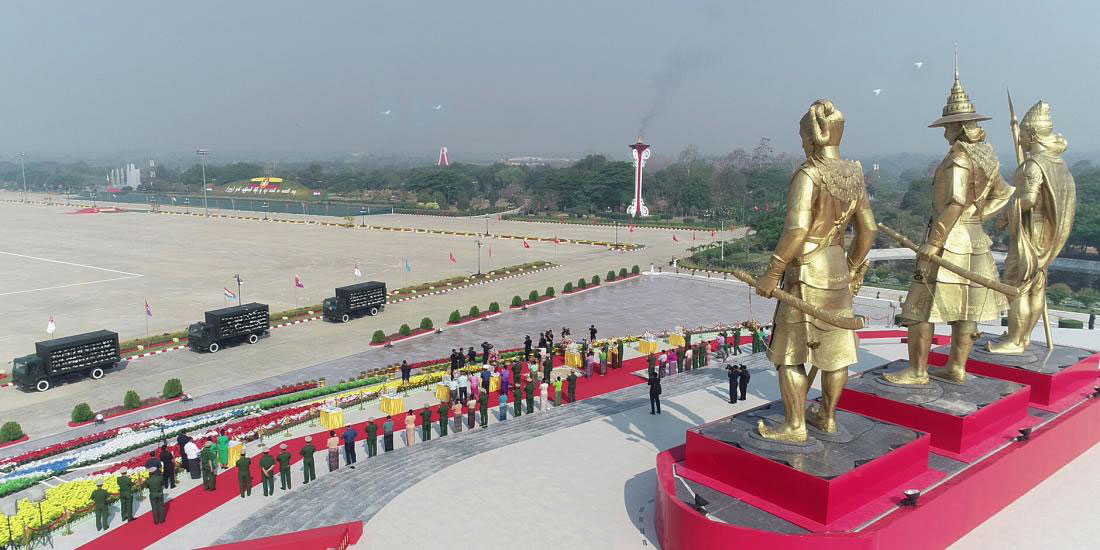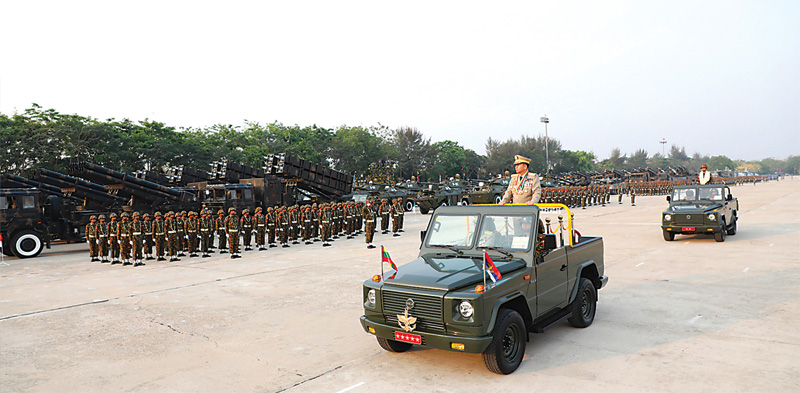- Weekly Highlights from Arakan State (Feb 2 to 8, 2026)
- Arakanese merchants seek access to Indian market via Mizoram trade route
- Education crisis deepens for IDP children in Arakan State
- Coalition forced led by AA advances toward junta No. 16 weapons factory in Bago Region
- A Glimpse Into the 2026 Arakan State Parliament
In Myanmar, Elections and Coups Go Hand-in-Hand
In Myanmar history, elections have often been followed by coups. In the latest instance, the military seized power from the democratically elected National League for Democracy (NLD) government on the day the newly elected parliament was set to convene.
20 Apr 2023

Written by Rammar Kyaw Saw
In Myanmar history, elections have often been followed by coups. In the latest instance, the military seized power from the democratically elected National League for Democracy (NLD) government on the day the newly elected parliament was set to convene.
The military used alleged electoral fraud in the 2020 general election as an excuse for the coup, after the NLD secured a landslide victory in the poll.
Over the course of the country’s history, the Myanmar military has used various excuses to seize power whenever a political party it dislikes wins an election. Myanmar has held 17 elections since 1922, including a bogus election in 2010 when the military’s proxy Union Solidarity and Development Party (USDP) won with so-called early votes and ballots by white card holders, who are not even citizens.
Just like the dictator General Ne Win promised an election after a takeover in 1962, junta chief Min Aung Hlaing has also proposed holding a new election, replacing the current first-past-the-post electoral system with one based on proportional representation.
After decades of authoritarian rule, a popular uprising in 1988 led to Ne Win’s ouster. General Saw Maung took over power, and formed the State Law and Order Restoration Council, promising an election.
The Myanmar military said it would return to the barracks after the election was over, but it broke its promise. When the National Unity Party, the successor of the Burma Socialist Programme Party, suffered a humiliating defeat to the NLD in the 1990 general election, the Myanmar military seized power again. It detained senior NLD leaders and handed them long prison sentences.
In 1993, the regime convened a national convention to draft a new constitution. After some parties including the NLD boycotted the convention, which was criticised as being merely a rubber stamp for the regime’s draft charter, the convention was held on and off for years. Drafting was completed in 2007, and the constitution was ratified in 2008.
Among the delegates who drafted the 2008 constitution, only 15 percent of those who won in the 1990 election participated, with the remaining representatives chosen by the then military regime.
The 2010 general election was held in accordance with the 2008 Constitution, which was designed for the military to hold onto power. As many predicted, the USDP won most of the constituencies and was able to form a government. The parliament, dominated by ex-military officers, initially compromised with the administration, but later saw some friction due to a rift between former President U Thein Sein and former parliament speaker Thura U Shwe Mann.
The NLD won more than 40 seats in a 2012 by-election and was able to submit important motions in the parliament. But even Daw Aung San Suu Kyi fell victim to President U Thein Sein’s political gamesmanship, as she accepted a political albatross around her neck in the form of the president’s appointment to chair an inquiry commission for the Letpadaung copper mine project, where peaceful protesters were brutally cracked down on by security forces in 2012.
Nonetheless, when the NLD won a nationwide landslide victory in the 2015 general election, Myanmar people and the international community hoped that democracy would finally flourish in Myanmar. But misunderstandings with ethnic leaders, the NLD’s cozying up to the military (or at least perceptions thereof) and political arrogance (or at least perceptions thereof) led to a five-year rule that was bumpy and fell short of the expectations of many.
In any case, if it were allowed to compete under a fair constitution and an honest administrative system, the NLD is the only political party currently in existence that could win decisively at the national level, as it did in 2015 and 2020. The party’s electoral success was arguably its downfall, however, as the military clearly felt its only path to power under the previous, democratic system was to stage a coup.

Even if the USDP does not win the upcoming election outright, it seems that it is prepared, if necessary, to form a government together with representatives of allied political parties, which will receive proportional representation in the legislature, and the representatives of the Myanmar military, which is guaranteed 25 percent of seats in the parliament.
Junta boss Min Aung Hlaing previously said the next general election would be held in August 2023, but when he extended the state of emergency for another six months in early February, doubts about this year’s election prospects began to grow.
The military regime is unlikely to be able to hold a general election under the current situation, with a widespread armed uprising not showing signs of dissipating any time soon. And yet, many political analysts say an election is the military’s best shot at regaining a modicum of political legitimacy after a disastrous two years of rule.
So it should come as no surprise that the regime would seek to stack the electoral deck in its favour. The junta enacted a new Political Parties Registration Law on January 31, which has served to further narrow an already shrunken political space.
According to the new electoral law, political parties at the national level must have 100,000 members, while parties at the regional and state levels must have 1,000 members. In addition, it stipulates that national-level political parties must have at least K100 million in funds and regional and state-level parties must have at least K10 million in funds.
If the 2023 general election can be held, the USDP will almost certainly be able to form a government, largely because several of its most formidable contenders — the NLD, Shan Nationalities League for Democracy, Arakan League for Democracy (ALD), Karen National Party, Mon National Party and Chin National Party — are unlikely to contest the junta-organised poll.
And if the military-backed USDP wins, the aftermath may be atypical, in that the military, for a change, may not feel compelled to stage another coup.






.jpg)













